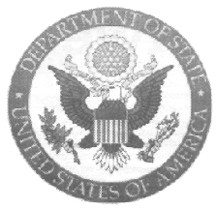On occasions, the US Embassy may request that immigrant visa applicants and their petitioning family members undergo a DNA test to prove a biological relationship. The following are common questions regarding these requests and information on why DNA testing is used.
Q: Why is it necessary to get a DNA test?
 Genetic testing is a useful tool for verifying a claim of biological relationship in conjunction with an immigrant visa (IV) application when no other form of credible evidence is available. DNA technology is the only non-documentary method accepted for proof of a biological relationship. However, due to the expense, complexity, and logistical delays inherent in the process, genetic testing is used only if no other credible proof (documentation, photos, etc.) of the relationship exists.
Genetic testing is a useful tool for verifying a claim of biological relationship in conjunction with an immigrant visa (IV) application when no other form of credible evidence is available. DNA technology is the only non-documentary method accepted for proof of a biological relationship. However, due to the expense, complexity, and logistical delays inherent in the process, genetic testing is used only if no other credible proof (documentation, photos, etc.) of the relationship exists.
Q: How do you test DNA? Will the applicant have to give a blood sample? Does it hurt?
The preferred specimen collection technique for DNA testing is by buccal (cheek or mouth cavity) swab. When buccal swabs are taken, cells are collected from the inside cheek using a long cotton swab. Cheek swabs are preferred over blood samples because they are easier to collect, non-invasive, painless, and easier to ship. The accuracy of a DNA test conducted with a cheek swab is equivalent to a test conducted using a blood test, and, unlike blood, cheek swabs are not considered to be bio-hazardous.
Q: After the DNA test is completed, how soon does the Embassy send the test back to the lab in the United States?
Once the test is completed, the DNA samples must be placed into the pre-paid shipping envelope, sealed, and shipped as soon as possible – preferably the same day. All DNA samples must be shipped within 24-48 hours after collection is complete. The DNA sample kit and all chain of custody materials are controlled items and must be stored securely until the kit is shipped back to the U.S.-based lab. The consular officer is responsible for the kits until they are turned over for shipment.
Q: How long does it take to get the results, and can the applicant or petitioner see the DNA test results?
Typically it takes between two and four weeks for the Embassy to receive the DNA test results. Since the applicant or sponsor bears full financial responsibility for testing, that person may also receive a copy of the results directly from the laboratory or panel physician. The U.S. Embassy is not authorized to give copies of DNA test results directly to petitioners, applicants, or other parties.
Q: Once the DNA test results are in, will the visa be issued?
After the Embassy receives the results and processes them in the computer system, it may still take some time to continue processing the immigrant visa application. Establishing the biological relationship between the applicant and their petitioning family member is one part of the immigrant visa process. Once the application is complete, and all of the information is correct, a determination can be made on eligibility for a visa.
Q: What happens if the results from the DNA test are negative?
DNA testing reliability has advanced to the industry-accepted standard of 99.5 percent. Consular officers may only accept test results reporting a 99.5 percent or greater degree of certainty with respect to paternity/maternity as sufficient to support a biological relationship between a parent and child in visa cases. If it is not possible to reach the accepted level, and the consular officer is not convinced of the bona fides of the relationship in question, the petition will be returned to the Department of Homeland Security (DHS)/U.S. Citizenship and Immigration Services (USCIS)
Q: Is it possible to see where the DNA test kit is in the process?
The applicant or petitioner can ask the DNA test lab for the tracking number of the DNA test prior to its arrival at the U.S. Embassy in Guyana. Once the DNA test has been administered, the consular officer may provide the shipping company’s tracking number to track the package’s route back to the DNA testing lab in the United States. When the lab sends the results, the applicant or petitioner may request the tracking number from the lab to see when the Embassy will receive the results.
Q: Where can we find more information about DNA testing at the US Embassy in Guyana?
DNA testing procedures can be found on the United States Embassy Georgetown website http://georgetown.usembassy.gov under the forms and information sheet section of the Immigrant Visas tab. Any specific questions about DNA testing can be sent to visageorge@state.gov
***
“Ask the Consul” is a fortnightly column from the U.S. Embassy answering questions about U.S. immigration law and visa issues. If you have a general question about visa policy please email it to us at AskGeorge@state.gov. We select questions every other week and publish the answers in Stabroek News and on our website at http://georgetown.usembassy.gov/ask-the-consul.html. Information about visas and travel can be viewed at http://georgetown. usembassy.gov, http://travel.state.gov, and at http://www.dhs.gov. Applicants are strongly encouraged to prepare their own documents and avoid “visa advisors/brokers”.
Other than the questions we select, we DO NOT respond to questions sent to Ask the Consul. Please contact the visa inquiries unit (email visageorge@state.gov or call 225-7965 between 8 am and 4 pm Monday through Friday) if you have questions about a specific case.








